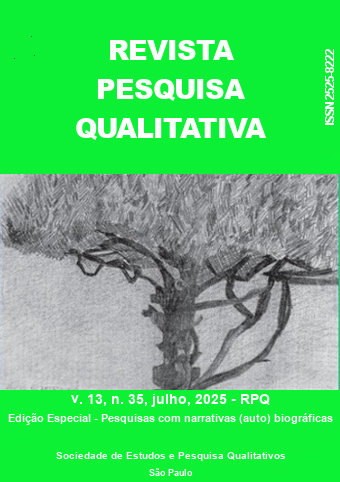Teaching paths: education, experience and autobiographical research
DOI:
https://doi.org/10.33361/RPQ.2025.v.13.n.35.1050Keywords:
Experience, Narrative, Time, Teacher training, CreationAbstract
This article aims to reflect on teacher training at a higher education level, with and from an attentional walk (Ingold, 2015) developed in a pedagogy discipline at a public university. In "narrating the experience", the text criticizes the teleological perspective of education and denounces the existence of a "dogmatic image" of teaching (Deleuze, 2009). When narrated, the journey is configured as a device capable of forging changes in students' perceptions and expectations about training and, consequently, shifts in the way teachers conceive of their work. By "thinking about the narrated experience", the aim is to build a cartography capable of giving visibility to the new meanings expressed by the students. Throughout the text, there is a defense of the "politics of narrativity" (Passos; Barros, 2009) as a way of affirming (autobiographical) research.Downloads
References
ALVAREZ, J.; PASSOS, E. Cartografar é habitar um território existencial. In: PASSOS, E.; KASTRUP, V.; ESCÓSSIA, L. da. (org.). Pistas do método da cartografia: pesquisa-intervenção e produção de subjetividade. Porto Alegre: Sulina, 2009. p. 131-149.
BIESTA, G. The beautiful risk of education. Boulder and London: Paradigm Publishers, 2013.
BRASIL. Lei nº 9.394, de 20 de dezembro de 1996. Estabelece as diretrizes e bases da educação nacional. Diário Oficial da União, Brasília, DF: 1996. Disponível em: https://www.planalto.gov.br/ccivil_03/leis/l9394.htm. Acesso em: 26 fev. 2025.
CITTON, Y. Pour une écologie de l`attention. Paris: Seiul, 2014.
CLANDININ, J.; CONNELLY, M. Pesquisa narrativa: experiências e história na pesquisa qualitativa. Uberlândia: EDUFU, 2011.
DELEUZE, G. Diferença e repetição. São Paulo: Graal, 2009.
DELEUZE, G. Os intelectuais e o poder. In: DELEUZE, G. Ilha deserta e outros textos. São Paulo: Iluminuras, 2006. p. 265-273.
DELEUZE, G. Proust e os signos. Rio de Janeiro: Forense Universitária, 2010.
DELEUZE, G.; GUATTARI, F. Mil Platôs: capitalismo e esquizofrenia. Rio de Janeiro: Editora 34, 2000. v. 1.
DELEUZE, G. Mil Platôs: capitalismo e esquizofrenia. Rio de Janeiro: Editora 34, 2012. v. 3.
DELEUZE, G. Mil Platôs: capitalismo e esquizofrenia. Rio de Janeiro: Editora 34, 1997. v. 4. DOI: https://doi.org/10.1590/S0104-93131998000200008
DIAS, R. Formação inventiva de professores. Rio de Janeiro: Lamparina, 2012.
FOUCAULT, M. A escrita de si. In: FOUCAULT, M. Ética, sexualidade, política. Rio de Janeiro: Forense Universitária, 2006. v. 5. p. 144-162.
HARAWAY, D. Ficar com o problema: fazer parentes no Chthuluceno. São Paulo: n-1 edições, 2023.
INGOLD, T. Dédalo e o labirinto: caminhar, imaginar e educar a atenção. Horizontes Antropológicos, Porto Alegre, ano 21, n. 44, p. 21-36, 2015. DOI: https://doi.org/10.1590/S0104-71832015000200002
KASTRUP, V. A invenção de si e do mundo. Uma introdução do tempo e do coletivo no estudo da cognição. Belo Horizonte: Autêntica, 2007.
KOHAN, W. A infância da educação: o conceito devir-criança. In: KOHAN, W. Infância, estrangeiridade e ignorância. Belo Horizonte: Autêntica, 2007.
MASSCHELEIN, J. E-ducando o Olhar: a necessidade de uma pedagogia pobre. Educação & Realidade, Porto Alegre, v. 33, n. 1, p.35-48, 2008. Disponível em: https://seer.ufrgs.br/index.php/educacaoerealidade/article/view/6685. Acesso em: 17 fev. 2025.
MASSCHELEIN, J.; SIMONS, M. Em defesa da escola: uma questão pública. Tradução de Cristina Antunes. Belo Horizonte: Autêntica, 2013.
PASSOS, E.; BARROS, R. Por uma política da narratividade. In: PASSOS, E.; KASTRUP, V.; ESCÓSSIA, L. da. (org.). Pistas do método da cartografia: pesquisa-intervenção e produção de subjetividade. Porto Alegre: Sulina, 2009. p. 150-171.
STENGERS, I. No tempo das catástrofes. São Paulo: Cosac Naif, 2015.
Downloads
Published
How to Cite
Issue
Section
License
Copyright (c) 2025 Qualitative Research Journal

This work is licensed under a Creative Commons Attribution 4.0 International License.
Essa revista é licenciada pelo sistema creative commons 4.0, não-comercial.
















